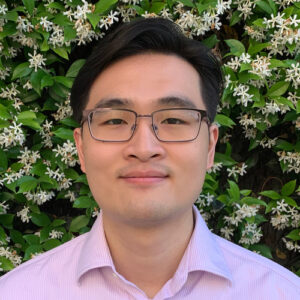Ph.D. Student Andrew Chio Named ARCS Scholar, UC National Lab In-Residence Fellow

Fourth-year computer science Ph.D. student Andrew Chio was selected as an ARCS Scholar last month by the ARCS Foundation, which supports outstanding students who are advancing science and technology in their research.
“My overarching research interests revolve around developing middleware systems for real-world problems, many of which additionally rely upon mathematical optimization techniques and applications of machine learning methods,” says Chio. “I find it very exciting to see when theoretical systems are implemented, and make a real-world impact on the cities and communities that we all live in.”
Chio’s research at UCI is also related to Internet-of-Things (IoT) and infrastructure resilience. When Chio was an undergraduate computer science major, he was invited to join the Distributed Systems Middleware (DSM) group after taking Computer Science Professor Nalini Venkatasubramanian’s operating systems course. She is now his Ph.D. advisor.
“Overall, I am incredibly grateful and appreciative for all the experiences with the professors I had here in my undergraduate years who pushed me to higher standards and really had a passion for teaching,” he says, adding that Computer Science Professor of Teaching Emeritus Richard Pattis was one of the professors who impacted him the most. Chio mentions, “The support and guidance I got here really allowed me to be able to succeed.”
As an undergraduate research assistant in the DSM group, Chio first worked in the TIPPERS (Testbed for IoT-based Privacy-Preserving PERvasive Spaces) project, which won the Naval Information Warfare Systems Command (NAVWAR) Innovation Award in 2021. His work recently received the Mark Weiser Best Paper Award.
“My efforts here were dedicated toward designing SmartSPEC, a synthetic data-generation tool that produced semantic trajectories of people in a customized smart space setting,” says Chio. “These types of tools can really help in understanding what happens in a space, which can allow us to study the impact and efficacy of resilience measures.”
Now, Chio is a graduate research assistant working as part of the DSM’s SWADE (Smart WAter Data Exchange) project led by Venkatasubramanian. SWADE aims to design and develop next-generation water systems by leveraging IoT and data-driven methods.
One of the problems Chio is studying here is stormwater systems, which helps reduce flood risks and improve water quality, among other benefits for the environment and people. He is focused on “where to best deploy IoT sensors to optimally observe the stormwater network” and “how to accurately infer potential points of origin for any detected anomalies (e.g., pipe faults, illicit discharges).”
According to Chio, “By efficiently detecting and alerting relevant authorities to issues within the network, we can limit the ecological impact of anomalies and provide a robust monitoring framework for real-world critical infrastructure.”
Chio received a highly competitive UC National Lab In-Residence Graduate Fellowship for his project “Integrating Model and Data-Driven Methods in IoT-enabled Resilient Infrastructure” in addition to being selected as an ARCS Scholar. He is currently at the Los Alamos National Laboratory (LANL).
“I was really happy to be given the opportunity to work with top researchers at the national labs on designing state-of-the-art solutions to address real-world issues of infrastructure resilience and sustainability on a broader, nationwide scale,” says Chio. “I was likewise ecstatic for the ARCS Scholar nomination, to be given a platform to meet and share ideas with my peers.”
Chio is mentored by Russell Bent and Andrey Lokhov at LANL on his infrastructure resilience research. His work includes developing various enhanced monitoring and analytic tools with IoT middleware, artificial intelligence and machine learning methods, and data-driven models.
Chio will work at LANL until the end of this year and return to the lab in summer 2023. In his free time, he enjoys watching anime and spending time with his friends.
“I also have a passion for teaching and tutoring others. In the future, I hope to stay in academia and help guide the next generation of students and researchers,” says Chio.
Learn more about Chio’s research by visiting his website.
— Karen Phan